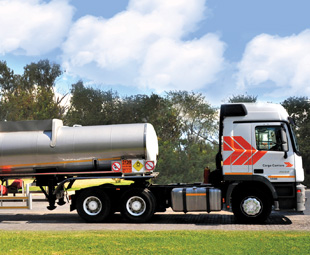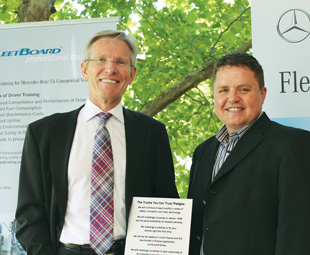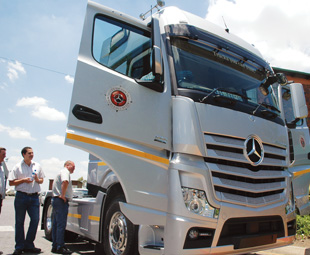All aboard the FleetBoard express

Mercedes-Benz South Africa and Cargo Carriers have reached a milestone in terms of both their relationship and FleetBoard’s presence in the country, with the latter commanding a 100-plus strong fleet using the former’s telematics system. JACO de Klerk joined the celebrations.
Mercedes-Benz South Africa (MBSA) and the supply chain and logistics service provider Cargo Carriers have passed the first “100 active FleetBoard vehicles” mark in the country, with Cargo Carriers now having 102 Actros 3s on the FleetBoard system.
The achievement was celebrated at the service provider’s Sasolburg Depot at the end of November last year, but the FleetBoard-fitted vehicles operate from various depots across the country – using the system’s fuel consumption monitoring capabilities to keep operational costs to a minimum.
“In the early days of launching FleetBoard in South Africa, we worked a lot with Cargo Carriers,” explained Zamani Mbatha, media specialist for MBSA Commercial Vehicles. “Now they are seeing the benefits of this system working to their advantage.”
Clinton Savage, divisional manager of Mercedes-Benz’s Truck Division, mentioned that Cargo Carriers had great success during the months preceding the FleetBoard fleet celebrations, adding that it was an honour for MBSA to participate in the achievement.
“We’ve spent a lot of effort and time trying to bring FleetBoard into the fleet and now we have a fantastic partnership,” he said. “However, FleetBoard just forms a part of what you guys are doing and the benchmarks that you are setting, and it’s really great for us to be party to this.”
It is all good and well that FleetBoard played its part in Cargo Carriers’ success and that MBSA is ecstatic about being part of this, but how did the telematics system achieve this exactly, and what features and service does it have and provide?
FleetBoard 101
The system was introduced to the international market in 2000, and entered South Africa in 2009. FleetBoard was the pioneer in onboard driver and vehicle management systems especially designed and fitted by an original equipment manufacturer. In short, this means that FleetBoard has been designed around and based on Mercedes-Benz’s specific vehicle paradigms and its intimate knowledge of the functionality of the Actros – with the system coming standard on all Actros 3s.
Since then, MBSA has added FleetBoard Professional Training to the telematics system’s package list; a driver training concept that is offered in conjunction with Mercedes-Benz Driver Training Services for all Mercedes-Benz commercial vehicle brands.
 The FleetBoard product thus enables fleet operators to conduct performance analyses and evaluations of drivers’ driving styles, providing data such as speed, braking behaviour and idling, and average fuel consumption. It also provides trip records, including vehicle moving and idle times, positions, weight and average speed. Additional functions include maintenance planning and real-time messages via e-mail and SMS.
The FleetBoard product thus enables fleet operators to conduct performance analyses and evaluations of drivers’ driving styles, providing data such as speed, braking behaviour and idling, and average fuel consumption. It also provides trip records, including vehicle moving and idle times, positions, weight and average speed. Additional functions include maintenance planning and real-time messages via e-mail and SMS.
The telematics system also offers telediagnostics, which allows the workshop to read error messages online, check that control devices are functioning properly, and immediately identify interferences or faults in the onboard electronic system of the truck.
FleetBoard’s technology enables users to monitor 100 percent of their vehicles’ vital signs and manage a number of operating costs. “It allows us to see exactly what is going on with the driver and what is going on with the vehicle,” explained Savage. “This enables us to pinpoint exactly where the opportunities for improvements are, and to tailor-make our training services correctly to address whatever might not be going according to plan.”
The monitoring process, as technical specialist for FleetBoard South Africa Naveen Sook explained, is made possible through the FleetBoard console, which links via a GSM network with a SIM card, to the FleetBoard service centre in Germany. From there, the information gets loaded onto the web, providing vehicle information to anyone who is logged in on the FleetBoard website at anytime. “It’s real-life information,” added Sook. “If you have access to the internet, you can monitor your fleet from wherever you are in the world.”
FleetBoard also recently launched an iPad and iPhone application, making the system completely mobile and thus even more convenient for transporters to use. “We will continue to bring out new technology, including hardware and software on all the products that we offer, to provide the best products that we can,” said Savage.
He added that MBSA recently introduced FleetBoard Stolen Vehicle Recovery Services, a 30-second tracking and recovery system that is relatively new to FleetBoard. “Basically, we can recover a vehicle fitted with the system anywhere in the country and certain areas all over Africa.” Savage explained that the telematics system was always aimed at driver and vehicle performance management: “And now that we have covered that gap, we will deliver a great service to our customers.”
The system provides a vehicle’s satellite position every 30 seconds, tracking reports every 10 minutes, and fuel consumption reports once a day or on request with the optional FleetBoard driver identification card.
But as they say on home-shopping TV ads – wait, there’s more! Indeed, FleetBoard delivers a number of additional benefits.
The true value of FleetBoard
Murray Bolton, joint chief executive of Cargo Carriers, praised FleetBoard for being a fantastic product, with the technology driving all manner of costs down. “The system also gives you the ability to cross-check,” he said. “For example, if you see that your fuel consumption is up, then you can cross-check it to the way the driver is driving the vehicle and what effect this is having on your costs.”
He said FleetBoard is one of the few systems he’s seen that provides this ability, enabling Cargo Carriers to drive the information back into its costs. “These things are real big factors in ensuring that cost effectiveness is taken care of,” he said.
And the all-important fuel consumption cost isn’t the only expense that gets squashed with FleetBoard, although the other costs are bit more difficult to calculate.
 “It is quite difficult to draw a direct cost benefit analysis around the system,” said Bolton, “but you certainly get a gut feel for it.” He explained that Cargo Carriers needed to monitor its vehicles in some way, but that the other systems it used provided mountains of data that took a great deal of time to analyse. “The other systems will give you, with a lot of time, the specs and the analysis of the data that comes out,” said Bolton. “But FleetBoard presents the data rather than you having to put in the time to analyse it.”
“It is quite difficult to draw a direct cost benefit analysis around the system,” said Bolton, “but you certainly get a gut feel for it.” He explained that Cargo Carriers needed to monitor its vehicles in some way, but that the other systems it used provided mountains of data that took a great deal of time to analyse. “The other systems will give you, with a lot of time, the specs and the analysis of the data that comes out,” said Bolton. “But FleetBoard presents the data rather than you having to put in the time to analyse it.”
He added that FleetBoard also provides information that other telematics systems don’t. “The fuel consumption savings are there, which is through-and-though a direct benefit that we can see, but the other benefits, such as the time it takes to actually analyse the data that comes out of other systems, aren’t as easy to quantify. But from my view, there are definitely additional cost benefits.”
The FleetBoard system also makes things far more accessible, enabling fleet operators and management to look at exactly whatever information they want to know – either for a particular vehicle or the fleet as a whole.
However, as Bolton pointed out, driving costs down isn’t Cargo Carriers’ only objective; it also strives to provide its customers with reliable transport services through dependable vehicles with more uptime.
In this regard, FleetBoard is again of assistance. As Savage explained: “We can actually see what is going on with the vehicles, and avert failures and ensure less downtime by preventing rather than just doing maintenance and ‘damage control’.”
He emphasised that, from a manufacturer’s point of view, Mercedes-Benz obviously wants to look at the fuel consumption value as it aims to ensure that its trucks provide lower cost of ownership, but, as Savage puts it: “Preventing failure is actually more important.”
He agreed with Bolton’s statement that it’s tricky to put a number to the cost savings FleetBoard provides, considering that this function is added to the telematics system’s arsenal. “It is very difficult to estimate what the costs would have been when, for example, a gearbox didn’t fail, even excluding the downtime,” Savage pointed out.
Of course, accidents do happen and one can’t plan for everything, but with FleetBoard even this aspect can be more easily dealt with. Because of the telediagnostics, the workshop can establish the problem and send the mechanic to the vehicle prepared. “In the past, the technician had to drive to the vehicle, determine the problem, then drive back to get the parts before returning to the vehicle to affect the repair.
“So you save on all the travelling and the additional downtime too,” noted Savage.
The vehicle and driver monitoring facilitated by FleetBoard also helps with the uptime of the vehicle, as John van Heerden, Cargo Carriers’ divisional driver trainer of the chemical, fuel and steel division, explained: “The major benefit of FleetBoard is the monitoring of drivers’ driving styles, enabling you to pick up on aggressive driving styles very quickly.” He added that aggressive driving is very hard on a vehicle’s clutch, which can break as a result.
“But FleetBoard allows you to monitor this and change it with corrective driver training – aiming towards defensive driving,” Van Heerden said. “You then reduce your fuel, which is your major operating cost, but what is not often realised is that you also reduce damage to the vehicle.”
He explained that the drivers are proud of what they do. “If you go to them and say ‘Listen, you’re doing this wrong and accelerating or braking too aggressively’, they welcome the constructive criticism because it makes them better professionals.”
Bolton added that the system thus changes the way the driver drives and interacts with the vehicle. Savage pointed out that the system doesn’t only record bad driving habits, but also reinforces positive behaviour. “If, for example, a driver is using the braking system properly, FleetBoard sends them a message saying ‘Well done on that braking’.”
Van Heerden added that a lot of the vehicles in the company’s tanker environment are running at over a million kilometres due to driver training. “It’s phenomenal that you can actually get vehicles to last far longer than normal from a good and well-trained driver,” he emphasised. “And that’s the true benefit FleetBoard provides; it changes the attitude of the driver towards a defensive and economic driving style.”
In the long run, said Savage, Mercedes-Benz will be able to look at fleets such as Cargo Carriers’ and say: “When we provide you with maintenance contracts, we will know exactly what is going on in your fleet in terms of maintenance and how your drivers are operating the vehicles’.” He added that the company will then be able to provide operators with reduced maintenance contracts because it knows that its systems and training is reducing downtime.
“This will be a really stunning system for customers in terms of reducing their cost of ownership in the long run,” he emphasised, adding that the company will be able to truly customise these products for each individual customer.
Bolton added that when this is incorporated within a vehicle that the company believes in anyway, the added brand value is tremendous.
Boarding pass to the FleetBoard express The Driver and Vehicle Management Package comes at a flat rate of R490 per month for the Actros 3, which is inclusive of the SIM Card and GPRS communication – with no roaming fees added for cross-border operators. The system has a four-month grace period, with a R9 900 activation fee and the first instalment payable after this interlude.
“It is important to note that, as from the second quarter this year, FleetBoard will also be standard on the Axor truck-tractor,” said Savage.
FleetBoard can also be fitted to the Atego, Mercedes-Benz’s vans and the Freightliner brand. According to Mbatha, fitment will be carried out by the dealer network, with the costs linked to the vehicle type and chassis number.
Bolton said that the technologies offered need to be at the forefront because there are numerous other options out there. “Mercedes-Benz, with its telematics system FleetBoard, certainly is one of the few suppliers that gives you the opportunity to use really innovative technology from around the globe.”
Published by
Focus on Transport
focusmagsa




